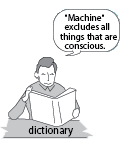Consciousness excluded by definition
The word "machine" excludes not only all things that can live or die but specifically all things capable of being conscious or unconscious, because that is part of the meaning of "machine".
Any attempt to cross-pollinate the categories of "conscious things" and "machines" violates thier inherent meanings.

Jonathan Cohen (1955).
'Machine,' as a category term, excludes not only all things that can be dead or alive but specifically all things capable of being conscious or unconscious, because that is part of the meaning of 'machine'. Any attempt to cross-pollinate that categories of 'conscious things' and 'machines' would violate the inherent meanings in the terms.
The Cohen argument
Cohen says:
"Of course, it makes sense to ask whether a robot could duplicate all forms of human behavior and sensitivity, and this is a legitimate problem for cyberneticists to discuss. But to have a mind of one's own entails a capacity for consciousness, only living things can have conscious and unconscious states, and 'machines do not even belong to the category of things which can be dead or alive'. Hence we have a paradox to puzzle us. 'On the one hand it does not seem that there is anything in the construction, constituents or behavior of the human being which it is essentially impossible for science to duplicate or synthesize. On the other hand there seems to be some important and meaningful descriptions of human behavior which can never be properly applied to machines.' And we resolve the paradox by coming to understand both these apparently conflicting truths well enough to recognize that they do not really conflict" (J. Cohen, 1955, p. 37).
References
Cohen, Jonathan. 1955. Can there be artificial minds? Analysis Vol. 16, No. 2, Dec. 1955. pp. 36-41.